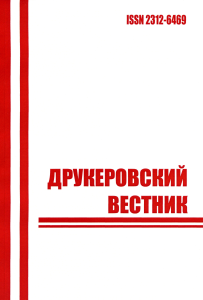Drukerovskij vestnik 2016; 2:
http://dx.doi.org/10.17213/2312-6469-2016-2-13-30-41
THE PROBLEM OF OPTIMIZING DEVELOPMENT OF REGIONAL ECONOMIC SYSTEMS ON ECOLOGIC PARAMETERS
Ratner Svetlana V. - Doctor of Economic Sciences, Leading Researcher
of Laboratory “Economic Dynamics and а Control for Innovations” of V.A.
Trapeznikov Institute of Control Science, Russian Academy of Science,
Moscow, Russia.
65 Profsoyuznaya st., Moscow, 117997, Russia
e-mail: lanarat@mail.ru
Abstract
The problem of stabilizing development for regional economic systems remains
relevant for the entire period of the Russian economic reform. Decreasing the negative
ecological effects of the economy remains problematic not only from the investment and
technological perspectives, but also from the scientific point of view, as decision-makers need
to account for a variety of social, ecological and economic effects when developing new
projects for development of the economy. The lack of complete understanding of the
ecological component in production and consumption, as well as of the practice of mandatory
life cycle analysis may lead to unexpected and undesired consequences when a decrease in
the negative ecological effect by one parameter (or parameter group) is completely abolished
by the increase of such an effect by another parameter (or parameter group). The goal of this
paper is to develop a method of ecological data envelopment analysis applicable to the
problem of evaluating the efficiency of regional economic systems based on a wide variety of
ecologic, economic and social criteria, accounting for the lack of complete information on
functional dependencies between ecologic and economic parameters.
Keywords: Data Envelopment Analysis, regional economy system, ecology effects, target setting approach.
Full text: [in elibrary.ru]
References
1. Государственный доклад «О состоянии и об охране окружающей среды в
Российской Федерации в 2014 году». М.: Росгидромет, 2015.
2. Иосифов В.В., Диброва С.С., Подворок И.И. Регулирование негативного
воздействия автотранспорта на окружающую среду с помощью стандартов моторного
топлива (на примере Краснодарского края) // Национальные интересы: приоритеты и
безопасность. 2015. №39.С. 48-60.
3. Иосифов В.В., Подворок И.И. Повышение энергетической эффективности
транспортных средств: мировой опыт // Управление инновациями – 2015: Материалы
международной научно-практической конференции / Под ред. Р.М. Нижегородцева,
Н.П. Горидько. – Новочеркасск: ЮРГПУ(НПИ), 2015.С. 122-127.
4. WorldEnergyOutlook 2012. SpecialTopics. IEA, 2012.
5. Fare R., Grosskopf S., Pasurka Jr., C.A. Accounting for air pollution emissions in
measures of state manufacturing productivity growth// Journal of Regional Science. 2001.
№41. Р. 381–409.
6. Seiford, L.M., Zhu, J. Modelling unde
sirablefactorsinefficiencyevaluation//European Journal of Operational Research.2002.No.
142.Р.16–20.
7. Хрусталёв Е.Ю., Ратнер П.Д. Выбор оптимальной стратегии перехода
региональной энергетической системы на низкоуглеродные технологии // Аудит и
финансовый анализ. 2015. №5.С. 395-400.
8. Хрусталев Е.Ю., Ратнер П.Д. Оценка экологической эффективности
электроэнергетических компаний России на основе методологии анализа среды
функционирования// Экономический анализ: теория и практика. 2015. №35.С. 33–42.
9. Хрусталев Е.Ю., Ратнер П.Д. Эко-инновации в электроэнергетике: оценка
сравнительной эффективности // Инновации. 2015. №9.С. 8-14.
10. Ратнер С.В., Ратнер П.Д.Моделирование структуры региональной
энергетической системы с использованием методологии анализа среды
функционирования // RussianJournalofManagement. 2015. Т. 3. № 2. С. 159-166.
11. Государственный доклад «О состоянии и об охране окружающей среды в
Российской Федерации в 2012 году». М.: Росгидромет, 2013.
